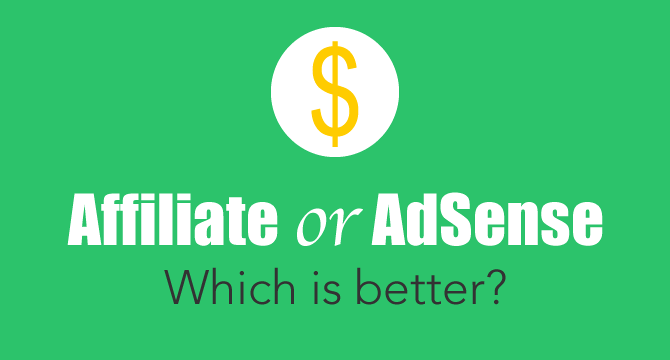Affiliate Marketing vs. Google Adsense
Lately, there has been a lot of discussion on how to make tons of money with Google Adsense. In fact, many people are making the claim that Adsense sites can earn a higher revenue than an affiliate-marketing site.
So that brings us to an important question: Which is a better online business – Affiliate-Marketing sites or Google Adsense sites?
Let’s explore each one and then find out which online business is a better option affiliate marketing vs. Google AdSense:
Google Adsense
How do you like earning money without dealing with customers or answering emails? This is possible when you run a Google Adsense site.
With Adsense sites, you can have a virtual passive income that requires little maintenance. But is this the best option for an online business?
Here are the positives of Google Adsense sites:
- They are perfect for people who run information sites that have no related affiliate product
- You can set it and leave it. With Google Adsense, you can create a content page, and there is little need to update the content.
- Adsense sites are easy to scale. Since they require little upkeep, you can easily create multiple websites that each make a nice income.
Here are the negatives of Google Adsense sites:
- They are not a great long-term solution. Instead of getting your visitors to subscribe to a mailing list, you are focusing on getting people to click on ads. Real online businesses concentrate on building assets that can be used for long-term growth.
- These sites are dependent on search engines. Most Google Adsense sites make the mistake of depending on search engines for the majority of their traffic. If the SE algorithms change, then your income might drop significantly.
Affiliate Marketing
Affiliate marketing is a performance-based advertising model where businesses reward affiliates for each visitor or customer brought by the affiliate’s marketing efforts. It’s a win-win: businesses gain exposure and sales, while affiliates earn commissions without the need to create products or handle logistics.
Being an affiliate marketer is excellent for those who want to build a theme site. With this type of business, you can easily create web pages around a topic and get people to buy products through your products. If done correctly, you can quickly build a loyal following to help you make money for years.
But can affiliate marketing make you more money than Google Adsense? Or what to choose affiliate marketing vs. Google AdSense?
Why Low-Competition Niches?
Low-competition niches, characterized by specific, often underserved markets, offer fertile ground for affiliate marketers. These niches allow for more targeted content, higher engagement rates, and less competition for search engine rankings, making it easier to establish a strong online presence.
In the vast and ever-expanding digital landscape, standing out and capturing the attention of your target audience can be a formidable challenge, especially with the saturation of content in popular markets. This is where low competition niche keywords come into play, serving as a strategic tool for businesses and content creators to carve out their own space in the crowded online world.
What Are Low Competition Niche Keywords?
Low competition niche keywords are specific phrases that target a narrow segment of a larger market or audience. These keywords typically have lower search volumes but also face less competition from other websites or businesses. The specificity of these keywords means they are highly relevant to a particular group of people or interests, making them incredibly valuable for targeting content and marketing efforts.
Why is Low Competition Niche Is Important?
- Easier Search Engine Ranking: With fewer websites competing for the same terms, ranking higher in search engine results pages (SERPs) for low-competition keywords is easier. This improved visibility can increase organic traffic to your website or blog.
- Higher Relevance and Conversion Rates: By targeting a specific niche, the content will more likely resonate with the audience, addressing their specific needs or interests. This relevance can lead to higher engagement rates, longer site visits, and, ultimately, higher conversion rates, whether that means sales, sign-ups, or another desired action.
- Cost-Effectiveness: Low-competition keywords can be less expensive to bid on for those utilizing paid advertising due to the reduced competition. This makes them a cost-effective option for driving targeted traffic to your site.
- Authority Building: Focusing on a niche allows you to create more detailed and specialized content, helping establish your site as an authority or go-to resource in that particular area. Over time, this can enhance your brand’s credibility and trustworthiness.
- Market Discovery and Innovation: Exploring low-competition niches can lead to discovering untapped markets or under-served audiences. Catering to these niches can set your business apart and open up new opportunities for innovation and growth.
How to Identify Low Competition Niche Keywords
- Keyword Research Tools: Utilize keyword research tools like Google Keyword Planner, Ahrefs, SEMrush, or Moz to identify niche keywords. Look for keywords with lower search volumes and competition scores.
- Analyze Search Results: Conduct searches for potential niche keywords and analyze the top-ranking pages. Look for keywords where the top results lack depth and relevance or are from lower-authority sites, indicating an opportunity to rank with high-quality content.
- Audience Insights: Engage with your target audience through social media, forums, and surveys to understand their interests, questions, or problems. These insights can reveal valuable niche keywords.
- Competitor Analysis: Examine your competitors’ websites and content to identify gaps in their coverage. Keywords that are less emphasized by competitors but still relevant to your audience can represent low competition opportunities.
 Here are the positives of affiliate marketing:
Here are the positives of affiliate marketing:
- A significant advantage of affiliate marketing is that you can build a long-term business that will generate revenue for years.
- With affiliate marketers, you need to focus on building an email list. This list is a significant asset to your business. Every time you have an offer, you can go to your list and increase your profits.
- Unlike Google Adsense sites, which only concentrate on high-paying keywords, an affiliate marketing site can be centered on a topic that you have an interest in.
 Here are the negatives of affiliate marketing:
Here are the negatives of affiliate marketing:
- You have to learn how to write persuasively and get people to purchase the product that you are recommending. For many people, this is a difficult skill to master.
- Each affiliate marketing site requires a lot of effort. You must spend a lot of time writing product reviews, building your email list, and creating web content.
So which is better: Affiliate marketing or Google Adsense?
The answer is that both are excellent solutions for an online business. Instead of choosing one over the other, you should create websites that can take advantage of both.
Here is how you can do this:
- Create a content site on a topic you are interested in while paying a reasonable amount per Adsense click.
- Integrate your Adsense into the menu bars and the top of your web content.
- Add web pages for affiliate products and your opt-in email list. But make sure that you leave out the Adsense blocks on these pages. This way you are ensuring that you are building your long-term assets.
- Create optimized web page articles that focus on a specific keyword phrase. Place your Google Adsense in these blocks.
- Provide your email list with good content and product recommendations. Once in a while, email your list and provide a link to some of your web articles. That way, you can earn a little bit of money from your subscribers while giving them good content.
By focusing on affiliate products and Google Adsense, you will build short-term and long-term profits. Now you know what to choose: affiliate marketing vs. Google AdSense.




















